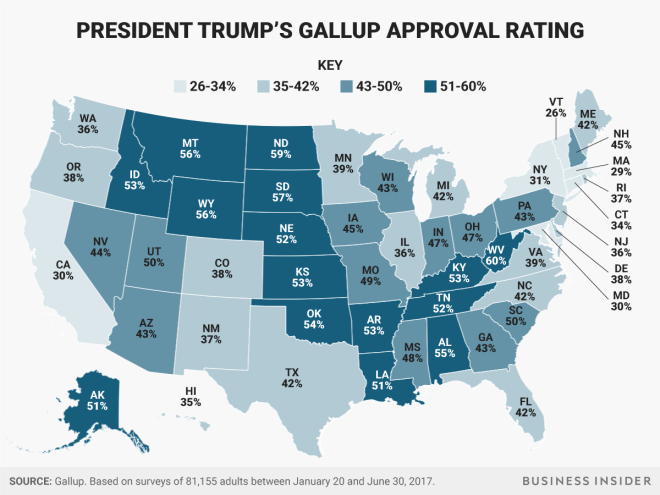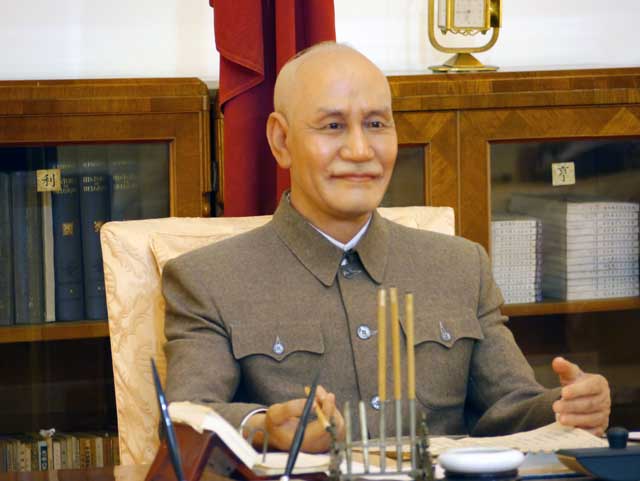“If when I die, I am still a dictator, I will certainly go down into the oblivion of all dictators. If, on the other hand, I succeed in establishing a truly stable foundation for a democratic government, I will live forever in every home in China.”
~ Former KMT President and Generalissimo Chiang Kai-Shek/蔣中正 (1887‒1975)
Though it’s nearly been a year since Trump and his administration have taken office—for those who know me very personally, including close friends and family, I rarely address Donald Trump as President because I see him as incredibly scandalous and unfit to hold the title, an incompetent strategist, a public liar, etc.—as 2017 dawned, media reports began to immediately flood the mainstream with stories of Trump’s ties to Russia and the mega-Tsarist Putin; the year that I have had to witness #AlternativeFacts and #MakeAmericaGreatAgain trend on Twitter and Facebook; and the year when Confederate flag-toting ignorant hillbillies militaristically marched through Charlottesville and chanted, “Blood and soil” (no need to give any news links to this last one).
On the other side of the ocean, however, we see a remarkably polar opposite movement of dissidents emerge in Taiwan: Tsai Ing-wen of the Democratic Progressive Party won the popular vote by nearly 2-1, displacing the Kuomintang (國民黨) once again since 2008.[1] But two years have somehow tragically passed since the first woman has ascended the office of the Presidency of the Republic of China (or should I instead say Republic of Taiwan?)—and surprisingly, if y’all have been keeping score at home will realize an eerie parallel is emerging.
Forget the threat of imminent threat of war with North Korea for just a second; and you will begin to notice very different world leaders behaving in remarkably similar ways.
Much like how progressives in the South have successfully elected incumbent US Senator Doug Jones in Alabama—effectively turning the deep-red state blue in over 25 years—and rising to topple and/or relocate monuments of former Confederate generals; in Taiwan, statues of the former President Chiang Kai-Shek have been repeatedly targeted and hacked by folks who apparently have some very deep-ridden resentment against his legacy.[2]
With the 71st anniversary of the 228 Incident (二二八事件) more than a month away, in previous years, I myself once authored a very empathizing piece to pro-DPP readers who may have had the chance to peruse this blog. But since the events that unfolded that day still draw extremely strong sentiments among Taiwanese schoolchildren today, I had actually decided to ease back on mine when I had written it at the time.
So… the rest of this article will not sit well for the faint of heart.
Yes, this is my official disclaimer. “Viewer discretion is advised.” You have been warned; take it or leave it.
As my own views on American politics and political parties have gradually changed and evolved over time—being raised as a GWB Republican in my boyhood versus my current pandering-to-the-socialist-part-of-me Democrat self—I have, relatively speaking, hardly budged from faithfully defending the ideals of the Chinese Nationalist Party, or Kuomintang as I have stated earlier.
Like many in their youth, I have been spoonfed history lessons since elementary school, and decided very early on that the best course of action was to never debate or challenge the facts surrounding these narratives. But as I’ve grown up, and have matured in my intellectual thinking and pursuits, moral sentiments indeed convince any sane person to start analyzing the truth and use clues to retrace what actually happened; albeit subjectively.
This is the main thesis of my op-ed today: What politics tries to do is to convince the average Joe that subjective truth and opinion hold greater weight and precedent than any actual objectivity—nine times outta ten.
This is why both Trump and Tsai Ing-wen are Presidents on opposite ends of the world right at this very moment; despite similarly low levels of public approval. In other words, this is not just a mere coincidence.
-

Bar Graph Indicating Percentages of Tsai Ing-wen’s Public Approval Ratings (as of January 6, 2018)
-

Trump’s Average Approval Ratings By All 50 States (as of June 30, 2017)
Now, I’m here to state for the record that I personally understand and deeply share the resentment of the political establishment in general—hell, I even voted third-party myself during the November 2016 US elections!
-

#JillStein2016 baby! 😀
But every time we hit a midterm election cycle, we cannot and should not be apathetic about whatever shit goes down in the news, and then casually pretend like it’s none of our fucking business. As a matter of fact, we ought to continue to keep our eyes, ears, brains and hearts open.
Why? Because the threat of another world war doesn’t feel so far off now…
And no, I’m not just talking about Kim Jong-un or Iran.
I’m also talking about China and Xi Jinping (習近平):
In order to fully understand the parameters of the frequently waxing and waning relationship between Mainland China and Taiwan, one can actually retrace this love/hate debacle as far back as the late 17th century.
In 1683, then-Qing Emperor Kangxi (康熙) had decided to enact his final plans to take Taiwan via military force and crush any remaining Ming loyalist forces. This was executed primarily as a way to legitimize his rise to imperial prowess and therefore, also legitimize the supposed superiority of the Manchu people over the Han groups who had fled there.[3]
You can read more about that history here, if you are interested:
Colonisation Without Exploitation: The Qing Policies in Taiwan During the Qing High Period by Ruiping Ye
By the time the Imperial Japanese have been defeated by both the Allied powers and Nationalist China during WWII, Taiwan had been absorbed as a Japanese colony for more than 50 years, from 1895 through 1945. In the years following, the Chinese Civil War (國共內戰) had reassumed between Chiang’s reserve forces and Mao Zedong’s guerrilla [mostly peasant] soldiers—who, although had been underequipped and greatly inexperienced than the KMT, benefited sufficiently from Soviet aid after Stalin declared war and invaded Japanese occupied territory in Manchuria.
Here’s a YouTube video on the entire conflict; again, if you are interested as I am:
Back to the present day for a bit: Since the late 1980s, we know that martial law was finally lifted in Taiwan after the death of CKS’ son, Ching-kuo (蔣經國). The 1990s thus is known as the calm before the storm of sorts when Beijing had begun drafting and implementing the One China Policy (一個中國政策).
It wasn’t until around 2000 when the de-Chiangification backlash had begun to come into public view throughout Taiwan, as Chen Shui-bian took office. Since then, as I have stated earlier, the DPP and their respective administrations have intentionally tried to write off the Chiang family and the Kuomintang as akin to being devils; while simultaneously praising the previous Japanese colonial era.
Across the mainland, ironically, the CCP in recent years has been proactively resurrecting the Generalissimo’s legacy, including but not limited to the following:
-
Acknowledging Chiang Kai-Shek’s and the Kuomintang’s pivotal role in the Second Sino-Japanese War (known in Chinese as the “8 Years of Resistance” or 八年抗戰)
-
Scholarly efforts by the current Xi administration in doing so[4]
-
Reopening Chiang Kai-Shek’s former Nanjing villas and memorabilia[5]
-
Allowing a statue of Chiang to be erected in his hometown of Xikou, Zhejiang Province[6]
-
Opening restaurants in his namesake and image[7]
-
Slowly, but surely, recharacterizing Chiang as a very human leader in more recent television shows and dramas—while simultaneously downsizing Mao Tse-tung’s roles
Speaking of shows and movies, I recently just finished watching a historical drama that was released back in 2015 called Cairo Declaration in English (開羅宣言 in Chinese). For all of you history buffs and nerds out there, as you may be able to guess by the title, the film centers around the 1943 Cairo Conference— where CKS, President Franklin D. Roosevelt, Prime Minister Winston Churchill and General Secretary Joseph Stalin meet in Cairo, Egypt to discuss plans of a world divided evenly among the leading Allied powers after the Axis nations are defeated:
In terms of the historical context that is actually presented, it is actually remarkably refreshing and objectively much more nonbiased than previous films sponsored by the CCP such as the 2009 release of The Founding of A Republic (建國大業 in Chinese).
There is also one particular quote spoken by the film’s Generalissimo (played by actor Ma Xiaowei) as he is speaking to his wife, Soong Mei-ling (played by actress Carina Lau):
這次三國坐在一起,可在邱吉爾的眼裡:
中國只是一個濟貧擊落所被大國。
Spoken in context, the following sentence can be translated colloquially as:
This time, when the [Big Three] Nations sit down together, in the eyes of Churchill: China is only a weak [easily exploitable] and fragmented nation.
By this, Chiang Kai-shek implies that Western powers only see him as a weak despot—torn by organizing regiments to fighting the Japanese, curb rampant corruption in his administration, and purging/battling the Communists from within.
While all of these factors were true at the time, he goes to say that Roosevelt only wishes to utilize the remaining Chinese divisions as buffer against the Imperial Japanese armies—in order to buy time and stall as the Americans wrap up the war in Europe first. This sentiment also has basis in historical reality, as the Generalissimo himself wished that America would provide even more substantial aid and arms to his already battered yet persevering forces.[8]
Yet, all of the Generalissimo’s wishes would be dismissed when Roosevelt unexpectedly dies a mere month before VE Day (May 8, 1945); and roughly 4‒5 months before VJ Day.[9]
For the sake of brevity, I’m not going to talk about much of President Truman with respects to Chiang and the history of the Chinese Civil War; since it is generally known among historians that Truman distrusted Chiang’s rule and may have even been a covert sympathizer of Mao’s communism. Feel free to Google more on this topic on your own as well.
I also heartily recommend this book: The Battle for Manchuria and the Fate of China: Siping, 1946 by Harold M. Tanner.

In closing, another reason why I am writing this piece is because I truly believe its scope needs to be much more than looking back into the annals and archives of history, and immediately conclude that Chiang was the good guy and Mao the bad (and vice versa). It’s a lesson for right now too.
Personally speaking, my family and I support the KMT’s founding principles to a fault; despite also taking many liberties to criticize current KMT policies and politicians (such as with former President Ma Ying-jeou) within Taiwan and abroad.
Though, if I were honest—if I am ever able to hold dual US-Taiwan citizenship in the near future—I would either vote KMT or third party in the primaries. Furthermore, I am definitely supporting Chairman Wu Den-yih (吳敦義) in the 2018 November elections.[10]
Best wishes across the Taiwan Strait and here in the States as well this year.
Cheers,
JC/陳祈安



Well written; hearty congrats. While I was your Home Teacher, your writing/typing speed was very slow and I wonder how long you would have talken to write this article! I am veryhappy to note that you are doing so well! George (We are now settled in Mumbai, India)
LikeLike
Hi there George,
Thank you for writing. This took me nearly 12 hours on and off to complete, although if I had fewer distractions at home with family, the actual writing only takes about 2-3 hours and the editing takes about 1 hour.
Hope this answers your question, and Happy New Year sir! 🙂
~ Joshua
LikeLike